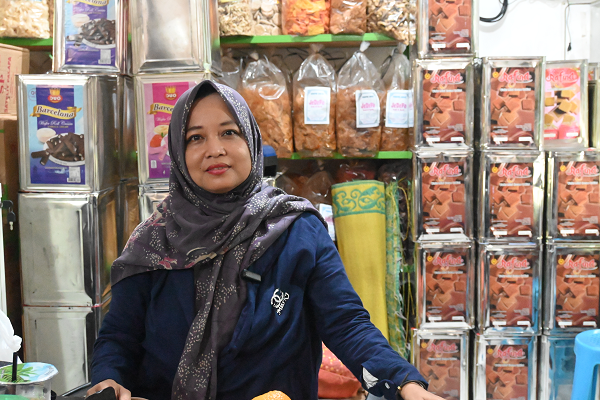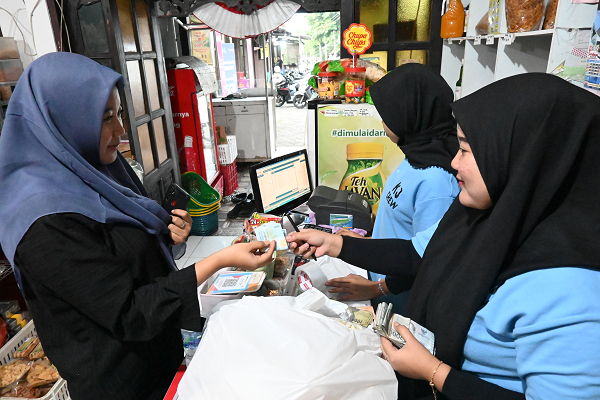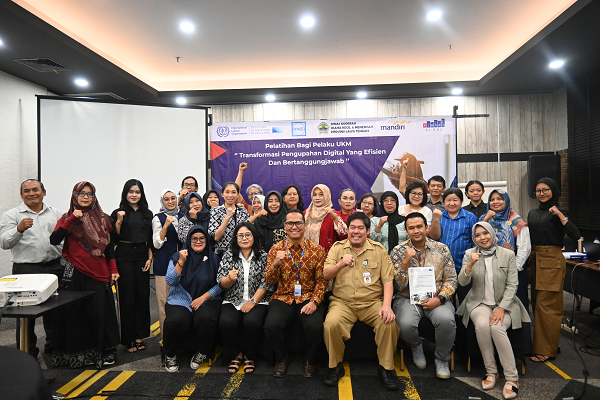Contact us: digitalwages@ilo.org
Indonesian small enterprises transition to responsible digital wage payments

In Semarang, Central Java, small business owner Farid Hidayah faces the challenges of transitioning from cash to digital wage payments for her 20 employees. Despite digital payment methods becoming more common, many small enterprises in Indonesia struggle with this shift. With the help of a responsible wage digitization training programme by the ILO and APINDO, Farid and over 100 other small enterprise owners in Central and West Java are learning to navigate this transition, aiming to improve efficiency, financial inclusion and workers’ rights.
In the outskirts of Semarang, the capital city of Central Java, Farid Hidayah manages Kurnia Jaya Snack, a small shop specializing in selling Indonesian crackers, famous in the neighborhood. Established in 2008, Ms Farid’s business continued to pay all of her 20 workers in cash, even as digital and financial infrastructure started to expand in the area and her business began to accept digital payments from clients.
Kurnia Jaya Snack is a good example of the challenges faced by small enterprises in peri-urban areas of Indonesia in digitizing wage payments. Despite the success of her business, Ms Farid still uses her personal bank account for all financial transactions and struggles to digitize the payroll process. A small number of her workers may have bank accounts, but she believes most of them do not. These challenges, however, have not stopped Ms Farid from looking for alternatives to cash when it comes to paying wages, as she also sees potential benefits in the transition.
Ms Farid is among the more than 100 small enterprises that have participated, in the first semester of 2024, in a responsible wage digitization training programme. This is an initiative co-organized by the ILO’s Global Centre on Digital Wages for Decent Work and the Indonesian Association of Employers (APINDO), with support from local government and financial sector partners in Central and West Java, such as the Regional Offices for Cooperative and MSMEs, Bank BJB and Bank Mandiri.

For two half-days, four groups of 25 small enterprises in Bandung, Semarang and Yogyakarta gathered to discuss and learn from case studies in the transition to digital wages, focusing on topics such as payroll digitization, negotiating with financial and payroll service providers, and strategies to support workers in receiving digital wages. As enterprises were encouraged to move from cash to payments into bank or mobile money accounts, participants also had the opportunity to discuss how to ensure this transition was done responsibly.
During the training sessions, participants welcomed representatives from government institutions and financial service providers who presented the benefits of digital wage payments for enterprises and workers, as well as digital financial solutions that could be available to them. For Eddy Bramantyo, Head of the Cooperative and MSME Office in Central Java Province, digital wage payments are an important element in increasing the digital transactions of small and medium-sized enterprises (SMEs) and contributing more to the digital economy. However, he considers that, in many situations, SMEs face various challenges in transitioning to digital wage payments. To Mr Bramantyo, the ILO has provided comprehensive training to SMEs with practical tools, which he hopes will guide business owners on how to start a responsible transition from cash to digital wage payments.
More than 90 enterprises signed up for a group mentoring programme, designed to offer them additional and tailored support in the transition over the three months following the training sessions. The mentoring activities focus on the main challenges identified with participating enterprises, such as the use of emerging digital technologies for wage payments, the benefits of business formalization and registration of workers to social security, and workers’ financial literacy.
After the training programme, Ms Farid has explored different alternatives to cash, including using mobile money, and has already started to pay some of her workers digitally: “The programme has made me aware that it is crucial to involve workers since the beginning of the transition to digital wage payments. Wage payments are much faster and more efficient, but one of the current challenges is the resistance from workers. I often engage in dialogues with them about the benefits of this transition and we evaluate how to proceed together. Currently, some workers are willing to be paid through bank transfers and some prefer to receive their wages through mobile money accounts. I have also started issuing pay slips and registering workers for social security as additional benefits.”

Lishia Erza, the APINDO’s Committee Chair for Capacity Building & Inclusive Economy: “The challenges that SMEs face today are not limited to high turnover, but also include how companies can be more efficient and effective, how they can attract talented workers and how they can benefit from financial and digital solutions. Transitioning from cash to digital wage payments responsibly could improve efficiency and enable SMEs to better structure their operations.”
The journey of enterprises such as Ms Farid’s Kurnia Jaya Snack strengthens the evidence of the positive impact of digital wage payments for both workers and businesses. The effective collaboration between local government institutions, financial service providers and employers’ organizations paves the way for scaling up the transition in West and Central Java.
